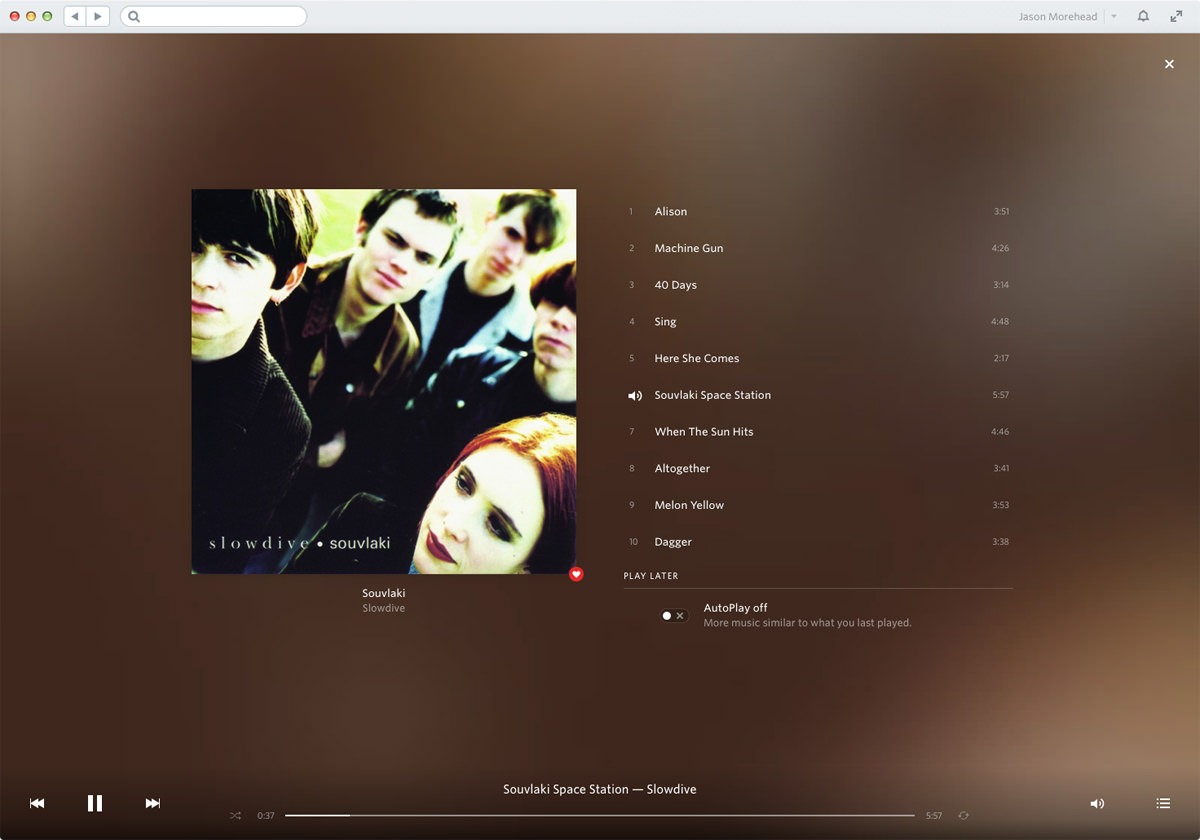Rest in Peace, Rdio

Longtime Opus readers will know that I’ve been pretty skeptical of music streaming services. Eventually, however, Rdio won me over, due in large part to its interface and design. Several years back, I read an interview with designer Ryan Sims, who worked at Rdio for awhile, where he said, “I remember using Rdio for the first time and thinking, ‘My god, this is it: this replaces iTunes for me.’ And I had been a religious iTunes user for years.” I had a similar reaction: Rdio was exactly what I wanted from a music service, especially in light of how bloated and convoluted iTunes was (and is) becoming.
Sadly, Rdio announced last month that it was being acquired by Pandora and filing for bankruptcy. There’s no word yet on what Pandora will do with Rdio’s staff and technology, but even if Pandora plans to launch a similar streaming service, it’s hard to imagine that they’ll recapture the simplicity and effortlessness that characterized Rdio.
I’m not the only one who feels this way. Shortly after Rdio’s announcement, my friend Aaron Grauer posted a series of tweets about his disappointment over Rdio’s shutting down. Here’s a few of them:
I’ve since switched to Spotify, primarily because that’s where everyone else is these days — I feel like such a lemming — but I’m not happy about it. I’ve reopened Rdio several times since the switch, mainly to grab playlist info, and every time I do, it’s a reminder of both what’s being lost and how ugly, convoluted, and just plain weird a replacement Spotify has turned out to be.
Bryan Clark recently wrote a very thorough breakdown of Rdio’s interface and what made it so special. For instance, discovering new music via your friends:
Find a few folks with good taste on Rdio, follow them, and Rdio’s Trending interface became super helpful. So many services just focus on the “Top Charts”, which means “here’s a ton of crap pop you might tolerate, but probably won’t cherish.” What made Rdio amazing was that it would show you what was trending among the people you follow. Meanwhile, it’s 2015 and neither Spotify nor Apple Music have this Albums-That-Are-Trending-Among-My-Friends interface.
Or, how Rdio handled adding items to your queue (tacking newly added items to the end of your queue) versus Spotify’s approach (inserting newly added items somewhere in the middle of your queue).
I’ve already linked to Paul Armstrong’s assessment of the post-Rdio streaming landscape but it’s worth sharing again simply for this part about Spotify’s design:
While Rdio and Apple Music utilize minimalism and simplicity in their interface, Spotify is like a 5 year old who won’t stop talking no matter how vigorously you ignore them, filling every moment of silence with noise. It’s the Windows 7 of music streaming design. If you like design, then Spotify will make your eyes burst with blood rage. If Spotify’s design were a taco, it would be from Taco Bell, and consuming it will give you hate shits. Where was I? Oh right, I strongly dislike the overall visual language of Spotify.
Admittedly, it might seem odd to get this worked up over software, over ones and zeros floating around in the ether. If anything, we should be used to apps, websites, and online services disappearing after awhile (Google Reader, anyone?) just as we should be used to the reality that it’s not always the best service that wins, but rather, the most popular and well-hyped. Such is the nature of technology these days, and maybe it’s good to hold on to these things somewhat loosely, to be a little less materialistic (if one can be said to be materialistic with regards to ones and zeros).
At the same time, though, Rdio provided a valuable service, and if you’re any sort of music aficionado, a service that was truly beneficial and enriching. Thanks to Rdio, I’ve been able to discover a lot of great music, and I was able to do so in a simple, elegant manner that, as an interface designer, I found inspiring. Maybe someday, something will come along that matches Rdio’s simplicity and elegance, but honestly, I’m not holding my breath. (Although, Pandora — if you’re reading this — I’d love to be proven wrong.)